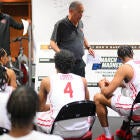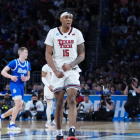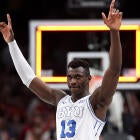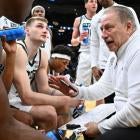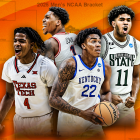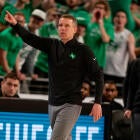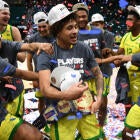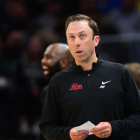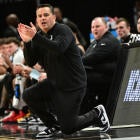Brad Underwood had already won 89 games in three seasons as a Division I head coach, finished first in the Southland Conference three straight times, won the Southland Conference tournament three straight times and advanced Stephen F. Austin in the NCAA Tournament twice.
But he had never made a Sweet 16.
Not yet.
And now he was seconds away.
Literally just two small seconds away in Brooklyn.
Meantime, Bret Just was back home in suburban Chicago watching Stephen F. Austin-Notre Dame on television like most of the rest of the country. He had been in Iowa three days earlier to witness one of his clients, Connecticut's Kevin Ollie, win a first-round game against Colorado on the opening Thursday of the 2016 NCAA Tournament before flying to New York the following morning to witness Underwood, another client, win a first-round game against West Virginia. But now Just, a basketball coaches agent with CAA Sports, was in his basement, free of airports and airplanes. And the reason was simple: He couldn't afford, both literally and figuratively, to fly again Sunday and risk missing a call or text from a search firm or athletic director as the so-called coaching carousel spun wildly.
So Just was in that basement.
Alone.
"With my phone next to me -- holding it like it's a winning Powerball ticket," he said, and, in many ways, it was. "I was just waiting for calls to come in and having conversations about various opportunities for other clients."
And watching the game intensely.
Stephen F. Austin's Thomas Walkup, who had become the early face of the 2016 NCAA Tournament after putting 33 points on West Virginia, had 21 points against Notre Dame in another fun performance. He had just missed a runner. But he and his 14th-seeded teammates were still up 75-74 with less than 10 seconds left. They needed a stop. One stop. That's it. One stop for a trip to the Sweet 16. Instead, they allowed Notre Dame to grab two offensive rebounds, the second of which resulted in a Rex Pflueger tip-in with 1.5 seconds remaining.
Final score: Notre Dame 76, Stephen F. Austin 75.
There would be no Sweet 16 for Underwood.
Season over.
But the craziness was just beginning.
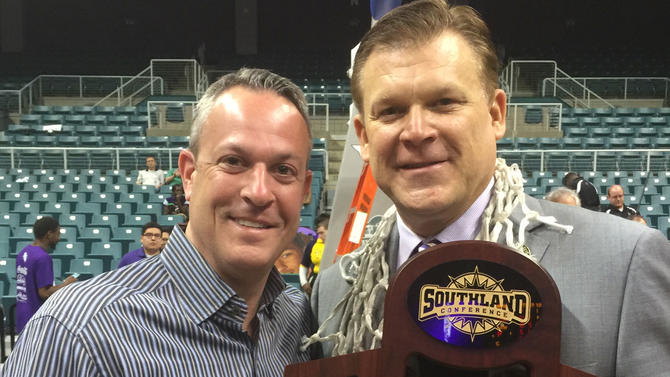
"Welcome to life as an agent for college basketball coaches in 2016," Just said with a laugh -- and what he meant is that he knew, soon as that buzzer sounded, that the next few hours would have him at the center of an emotional roller coaster that required him to present a client who doubles as a close friend with his greatest professional opportunity during the lowest moment of his professional career.
Think about that.
How many people have a best and worst day on the same day?
Underwood counts as at least one.
While Underwood was doing postgame interviews in New York with tears in his eyes, heartbroken by an opportunity missed, Just was in Illinois taking calls. One came from somebody working on behalf of Oklahoma State who relayed that the school was interested and eager to move fast. So when Just finally got Underwood on the phone, a couple hours after the game, he was faced with a complex situation. He had to console a client who had just experienced a basketball nightmare but then also let him know that the dream he has forever had of becoming a Big 12 coach was about to become true, if he wanted.
"It's a really weird dynamic," Just explained. "On one hand, I'm his agent, and one primary role of mine, and of any person who does what I do for a living, is to speak the truth, filter through information and add value to my clients, and now I have potential life-changing news for him. He played in the Big 12, was an assistant in the Big 12, always wanted to run a Big 12 program. And I'm so close with Brad that I know this is the kind of job that's always been a dream for him. And I'm about to tell him that his dream can become a reality. So that's great. But, on the other hand, it's the last thing he wants to hear when he has crying players right next to him. So you're despondent for him and thrilled for him at the same time. It's a strange feeling. And I go through it multiple times every year."
Will Reece founded NextLevel Sports with Joey McCutchen in 2006. When it launched, they had zero clients -- somewhat because there wasn't really a market for representing college basketball coaches back then.
"It's common for college basketball coaches to have representation now, but it wasn't 10 years ago," said Reece, who represents Stanford's Jerod Haase, Georgia Tech's Josh Pastner and about 20 other coaches today. "At one point it was just the Coach Ks of the world -- guys with big profiles -- who had representation. But now there are video coordinators with agents."
Incredibly, that's probably true. And it has created a growing market where men who are mostly anonymous to casual sports fans operate behind the scenes and end up with their fingers on college basketball coaching searches from coast to coast, both big and small, year after year after year.
Everybody knows Jimmy Sexton on the college football side of things.
And he has some basketball clients, too.
But coaching searches in this sport that annually delivers March Madness typically feature a handful of less-famous agents -- most notably Bret Just and Jordan Bazant. There's also Will Reece and Jason Charney, Dennis Coleman and Jason Belzer, Mark Carmony and Spencer Breecker, Rick Giles and a handful of others. And when I asked Bazant for the biggest change he's noticed over the past decade, his response was a predictable one.
"It's the amount of people who want to get into the business," answered Bazant, a Vanderbilt graduate who signed his first college basketball coach in 2003. Bazant joined WME earlier this year and now has a list of clients that includes Mississippi State's Ben Howland, North Carolina State's Mark Gottfried, Notre Dame's Mike Brey, Iowa's Fran McCaffery, Rutger's Steve Pikiell, Iowa State's Steve Prohm, Arizona State's Bobby Hurley, Rhode Island's Dan Hurley, Georgia's Mark Fox, Cincinnati's Mick Cronin, Creighton's Greg McDermott and Northern Iowa's Ben Jacobson.
According to Bazant, his profession is more crowded than ever. But, everybody agrees, he and the aforementioned Bret Just are at the top of it in terms of the quality of the clients they represent.
Just's story is an interesting one.
He's a former Tulane basketball player who was a high school basketball coach for 13 years before joining CAA in 2011, right before the Final Four in Houston. He went there with some relationships but zero clients.
"I was just down there trying to mix it up with people," he said. "I wanted to cultivate relationships that I already had and begin to develop new ones."
Randomly, Just bumped into then-Green Bay coach Brian Wardle at a restaurant. They knew each other because Wardle had, once upon a time, recruited one of Just's former prep players.
"He asked what I was doing now, and I told him," Just recalled. "So he says, 'That's awesome. We should talk.'"
Few months later, Wardle became Just's first client. And though he's still only been doing this for five years, Just -- thanks to a grinding and personal approach that keeps him on the road at games and inside practices for much of the season -- now also represents Texas' Shaka Smart, South Carolina's Frank Martin, Nebraska's Tim Miles, Texas Tech's Chris Beard, USC's Andy Enfield, Oregon State's Wayne Tinkle, Houston's Kelvin Sampson, and Syracuse coach-in-waiting Mike Hopkins -- plus Ollie and Underwood and many others. In the past few years alone, Just has been instrumental in helping multiple low-major coaches -- like Andy Enfield, Brad Underwood and Chris Beard -- jump to Power 5 leagues and several assistants -- like Lamont Smith, Steve Henson and Kyle Keller -- land their first head-coaching gigs at the Division I level. And he's developed a stable of NBA coaches, too.
In other words, in five short years, Just has acquired numerous clients.
Which means he now has lots of ups and downs all winter.
"It's like that for all of us," said Charney, who runs Charney Management Group and represents Xavier's Chris Mack, Manhattan's Steve Masiello, Chattanooga's Matt McCall, East Tennessee State's Steve Forbes and several other head coaches and assistants. "You experience great wins but you also get terrible losses. And Saturdays are the worst because you never go 20-0."
Mondays can be tough too, of course.
The first Monday in March earlier this year certainly was.
That's when Charney found himself in North Carolina for the Southern Conference Tournament final between Chattanooga and ETSU, meaning he had two clients competing for one NCAA Tournament bid. No matter how that game unfolded, Charney was guaranteed to have a devastated client -- either McCall or Forbes.
"I was actually lucky there because Forbes and McCall get along really well," Charney said. "But when something like that happens, I always go to the losers first. So I spent a lot of time in the ETSU locker room before I spent any time on the floor celebrating with McCall."
To be sure, with the rising amounts of money athletic departments are now paying college basketball coaches, the business of representing them has higher stakes than ever. Tens of millions of dollars in contracts, extensions and buyouts are negotiated each year, and agents get a cut of most of it because basically every relevant coach, and lots of irrelevant ones, have representation these days. Still, to a man, each agent I spoke with described the world in which they operate as mostly civil -- and way more civil than the cut-throat way in which agents who represent professional athletes and football coaches often maneuver.
"I do feel like there's a professionalism among college basketball agents," Bazant said. "Not one of us is going out there and trying to harm the others. It's a decent group of people. We're all competitive professionally. But I don't think anyone crosses the line inappropriately. And we actually view ourselves as colleagues because we can help each other."
On that point, Bazant accurately explained that it would make no sense for him to begrudge Charney for getting Mack a better deal at Xavier because doing so only increases the market for the Big East clients he represents. Similarly, it would be shortsighted for Reece to begrudge Just for getting a more lucrative deal for Enfield at USC because doing so only helps Reece when he tries to get a better deal for one of his Pac-12 clients.
So on and so forth.
They all directly and indirectly benefit from each other.
Bottom line, if you're a college basketball fan, keep these names in the back of your head next February, March and April, when head coaching jobs presumably open in every league. Jordan Bazant, Bret Just, Jason Charney, Will Reece and the others mentioned probably won't be in the headlines. But they'll definitely have a role in creating them -- same as they did earlier this year. And the year before that. And the year before that, too.
![[object Object] Logo](https://sportshub.cbsistatic.com/i/2020/04/22/e9ceb731-8b3f-4c60-98fe-090ab66a2997/screen-shot-2020-04-22-at-11-04-56-am.png)









